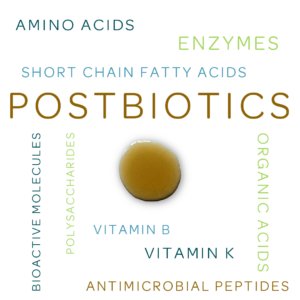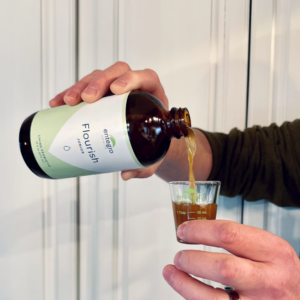What are Postbiotics?
In recent years, the field of gut health has gone through many shifts in focus beyond just the importance of probiotics. Likely, if you’re familiar with probiotics, you have also heard of prebiotics and how they can help feed the good bacteria in your digestive tract. But did you know there is a third amigo to complete this triad of ‘biotics’ called postbiotics?
Postbiotics
While probiotics are live beneficial bacteria, and prebiotics are the fibers that nourish them, postbiotics represent the beneficial compounds produced by the active probiotics. When probiotics eat and ferment prebiotics, they create these byproducts/metabolites naturally. To put it simply, probiotics plus prebiotics equals health-promoting substances called postbiotics!
Postbiotics can include various compounds such as short-chain fatty acids, organic acids, antimicrobial peptides, polysaccharides, enzymes, vitamins B and K, amino acids, and other bioactive molecules. Make sure to stay current with Entegro Health’s Blog Page as we will go over the different kinds of postbiotics in more detail in a future blog post.
Benefits of Postbiotics
Postbiotics can offer several health benefits to humans due to their various bioactive components produced during the fermentation process.
Gut Health and Digestive Comfort
For example, postbiotics in the form of short-chain fatty acids and organic acids can help create an environment in the gut that supports the growth of beneficial bacteria. We know how important maintaining a proper balance of good bacteria is for our microbiome as it is essential for digestion, nutrient absorption, and overall gut health. Even more, postbiotics may contribute to maintaining a healthy gut lining and reducing gut permeability. This can help in preventing the translocation of harmful substances from the gut into the bloodstream, contributing to better digestive comfort.
Metabolic Health
Some research suggests that postbiotics may have a role in improving metabolic health. Specifically, short-chain fatty acids can influence glucose and lipid metabolism, potentially contributing to better blood sugar control and lipid profiles.
Immune Modulation and Anti-Inflammatory Properties
Some postbiotics have been found to have immunomodulatory effects. This means they can influence and help regulate the immune system! This may result in a more balanced immune response, helping to defend against infections and reduce inflammation. Certain postbiotics, such as peptides and other bioactive molecules, may exhibit anti-inflammatory effects. This can be beneficial in managing conditions associated with inflammation, such as inflammatory bowel diseases.
Flourish Probiotics + Naturally Occurring Postbiotics
Flourish Original and Flourish Junior contain 11 strains from five different families. Not only that but the bacteria are kept in their most natural liquid environment, which retains all the postbiotic goods created by the bacteria during their growth phase. The powerful serving of just 1 Tablespoon provides a minimum of 8 billion CFUs of bacteria.
This diverse grouping of bacteria has grown up together meaning they are synergistic and do not compete with each other. Rather, they help each other out just like good friends. These fermented friends are acid-producing, creating an acidic environment and a favorable transport to the lower GI tract. Order Flourish probiotics today, and start feeling the benefits of our never freeze-dried liquid probiotics with their naturally occurring postbiotics.
The content in this article is not a substitute for professional medical advice, diagnosis, or treatment. Always seek the advice of your physician or other qualified health providers with any questions you may have regarding a medical condition. These statements have not been evaluated by the FDA. This product is not intended to diagnose, treat, cure, or prevent any disease.
Written by Kelsy Armstrong, Entegro Health
Sources:
- https://www.health.harvard.edu/nutrition/what-are-postbiotics.
- https://health.clevelandclinic.org/postbiotics.
- Gibson, Glenn R., et al. “Expert consensus document: The International Scientific Association for Probiotics and Prebiotics (ISAPP) consensus statement on the definition and scope of postbiotics.” Nature Reviews Gastroenterology & Hepatology 18.9 (2021): 649-667. https://pubmed.ncbi.nlm.nih.gov/28611480/.
- https://www.ncbi.nlm.nih.gov/pmc/articles/PMC8000401/.
- Morrison, Daniel J., and E. L. Preston. “Formation of short chain fatty acids by the gut microbiota and their impact on human metabolism.” Gut Microbes 7.3 (2016): 189-200.

 New customers! Get 11% OFF your first Flourish order with Code FRESHSTART11
New customers! Get 11% OFF your first Flourish order with Code FRESHSTART11